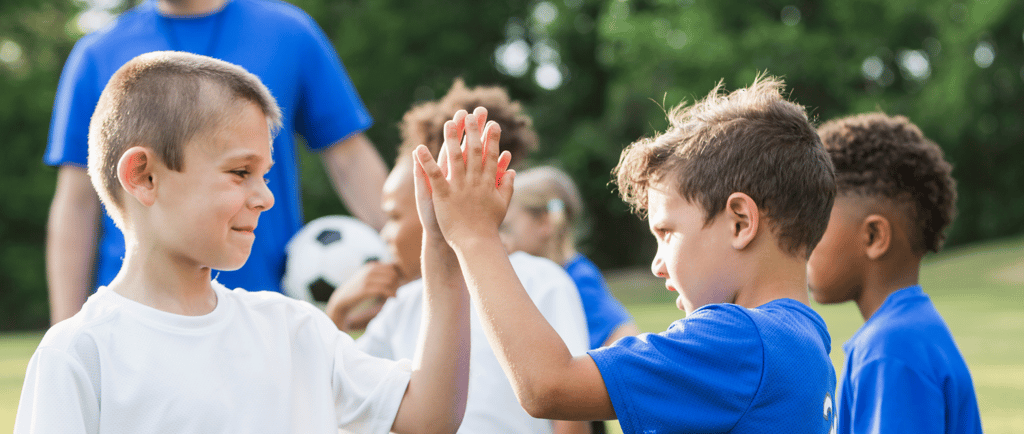The Importance of Good Sportsmanship
It might seem like a "given", but instilling good sportsmanship on a team takes more planning than you might think.
3 min read


Youth athletics offer a wonderful platform for children to learn and grow in a variety of ways. While physical fitness and skill development are often the primary focuses, an equally important aspect is teaching good sportsmanship. Good sportsmanship encompasses fair play, respect for opponents, and gracious behavior in both victory and defeat. As a parent-coach, you have the opportunity to instill these values in your young athletes, shaping not only their athletic careers but also their character and behavior in everyday life.
The Value of Good Sportsmanship
Good sportsmanship is fundamental to the ethos of sports. It teaches children to respect their opponents, the rules of the game, and the decisions of referees. According to the Positive Coaching Alliance, sportsmanship helps young athletes develop empathy, integrity, and a sense of fairness . These qualities are invaluable both on and off the field.
Research from the Aspen Institute’s Project Play indicates that children who exhibit good sportsmanship are more likely to enjoy sports, stay engaged longer, and maintain a positive attitude towards competition . And a study published in the Journal of Sport Behavior found that athletes who perceive their coaches as ethical and respectful are more likely to exhibit sportsmanlike behaviors themselves .
Techniques for Teaching Good Sportsmanship
Model Positive Behavior
Children often emulate the behavior of adults, especially coaches. Demonstrate good sportsmanship in all your interactions, whether it's respecting the referees, congratulating opponents, or maintaining composure during stressful moments.
Positive Reinforcement: Praise players for demonstrating good sportsmanship, such as helping an opponent up or accepting a referee’s decision without complaint.
Lead by Example: Show respect for everyone involved in the game, including opponents, officials, and parents. Your behavior sets the standard for your players.
Establish Clear Expectations
Set clear expectations for behavior at the beginning of the season. Make sure players understand the importance of sportsmanship and the consequences of unsportsmanlike behavior.
Team Code of Conduct: Develop a team code of conduct that outlines expected behaviors and have players and parents agree to it.
Regular Discussions: Hold regular discussions about sportsmanship and why it matters. Reinforce these principles throughout the season.
Teach Respect for Opponents
Encourage players to view opponents as partners in the sport rather than adversaries. Respect for opponents is a cornerstone of good sportsmanship.
Handshakes: Foster a tradition of shaking hands with opponents after games to show mutual respect.
Compliment Opponents: Encourage players to recognize and compliment the good plays and skills of their opponents.
Emphasize Fair Play
Make fair play a priority in all practices and games. Teach players to follow the rules and play honestly, regardless of the outcome.
Rule Education: Ensure that players fully understand the rules of the game. This helps them play fairly and reduces frustration.
Penalties for Cheating: Establish clear penalties for cheating or unsportsmanlike behavior to reinforce the importance of playing fair.
Handle Winning and Losing Graciously
Teach players how to handle both victory and defeat with grace. Emphasize that how they play the game is more important than the outcome.
Post-Game Reflections: After games, reflect on the team’s behavior as much as their performance. Praise gracious winners and respectful losers.
Celebrate Effort: Focus on effort and improvement rather than just winning. This helps players see value in their hard work regardless of the outcome.
Involve Parents
Engage parents in the process of teaching sportsmanship. Their support and reinforcement at home are crucial for consistent messaging.
Parent Meetings: Hold meetings with parents to discuss the importance of sportsmanship and how they can help reinforce these values.
Sideline Behavior: Encourage positive sideline behavior by parents. They should model respect for referees, opponents, and players.
Conclusion
Teaching good sportsmanship in youth athletics is crucial for developing well-rounded individuals who respect the game, their opponents, and themselves. As a parent-coach, you have the unique opportunity to model, teach, and reinforce these values. By setting clear expectations, fostering respect for opponents, emphasizing fair play, handling winning and losing with grace, and involving parents, you can create a team culture centered on good sportsmanship. This not only enhances the sporting experience but also instills life-long values in young athletes.
By focusing on these principles, you can ensure that your players learn the right ways to behave and act in various situations, promoting a healthy, respectful, and enjoyable sporting environment for all.

